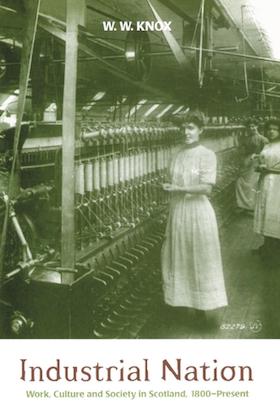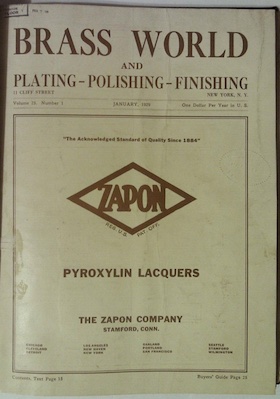
-----
Brass Finishers in the 1800's / 19th century
Quickstart: What was a "brass finisher", what did they do?
One thing they did apparently was die young :-(
Respiratory illnesses apparently were commonplace.
Q. I am researching people in the 1891 census of Duddeston, nr Birmingham and have found "Liley Wate", a BRASS POLISHER. She is cohabiting with Ada Fullelove a "JA?P?AN POLISHER" - the first word is pretty unclear. Can anyone guess what this word might be and also explain the job role?
Ada's husband, Harry, died in 1896 when he fell into a vat of boiling brewer's wort. What a way to go? Roderick
genealogist - Linconldshire, UK
January 12, 2024
⇩ Related postings, oldest first ⇩
Q. My great grandfather was listed in documents as an apprentice brass finisher and then brass finisher in documents of the last quarter of the 1800's. Could someone give me a rough idea what a brass finisher at that time would do? Thank you for any help you can provide.
Ann Terry 2003A. Great enquiry. Firstly, electricity was not readily available at that time so, depending on whether it was a large factory or a cottage industry, motive power would have been steam engine via overhead shafts and pulleys to a lathe, in the first instance. Or a treadle powered lathe. Either way ,such work is basically the same now, as then. Stock removal of flash, burrs and marks, using a variety of sanding, finishing buffing and polishing, belts and wheels. Working from the coarsest grits, slowly, finer and finer . Usually three or four stages, until complete. Very rewarding on different pieces. Very boring on repetitive pieces. Tapware, etc. Suggest you visit a co-operative Metal polisher with a camera.
Mark Gunn- NSW, Australia
Work in Nineteenth
Century Europe
by Lenard R. Berlanstein on

on eBay or Amazon
or AbeBooks
(affil link)
Q. I called the Public Library with an almost exact duplicate question that you had asked and they gave me this web site. I just discovered that an ancestor's occupation listed in the 1890 Cincinnati City Directory was Finisher Works. I thought they were tailors. However, I just discovered them in the Covington, Ky. City Directory 1890 & 1892 as brass finisher. I know very little about their early history in Cinti & Covington and so hope you might have found out more about this occupation and what they probably polished and how and where your family worked (maybe the same place or places.
Thank you in advance for any information you can give me.
- Cincinnati, Ohio
2004
? What is a Brass Finisher? The answer given does not really answer the question. What is a fisherman? Is he at the seaside with a small net or is he in a large sea-going trawler or factory ship catching tons of cod?
Peter Johnstonprivate family tree research - Morchard Bishop, Devon, UK
2006
Q. I was interested about the enquiry re the occupation of brass finisher in the 19th c. My great grandfather was a brass finisher in London and died aged 54 in 1901, from 'Phthisis Exhaustion' (TB). Does anyone know whether this was an occupational hazard? - I seem to remember reading that the trade was associated with pulmonary diseases.
Lottie Alexander- York, Yorkshire, England
2006
Coal, Smoke, and Culture in Britain since 1800
by Peter Thorsheim

on eBay or Amazon
or AbeBooks
(affil link)
Q. With regard to my former question I should perhaps add that my ^ great grandfather lived in London, England, between 1847 (when he was born) and 1902, when he died. During his working life he was stated as being a gas fitter at 1871 then a brass finisher from 1881 - certainly on his marriage and death certificates he was down as a brass finisher and in the censuses 1881-1901. He can't have worked much in the 1900s owing to his illness. I would very much like to know
a) EXACTLY what the daily life of a journeyman brass finisher was, how many hours worked, conditions, etc. and what the job itself was - where carried out- in foundries? and
b) were there unions to help during his illness, in Britain?
Is there anybody out there who might have the answer to these questions? Thank you.
- York, Yorkshire, England
A. In response to Lottie Alexander's letter regarding brass finishers. It would seem that pulmonary diseases could well have been an occupational hazard. My great grandfather's brother was a brass finisher in the 1880's in Sunderland from leaving school, and he died of pneumonia exhaustion at only 41 years of age.
DERRICK GRAHAM HOGGART- FERRYHILL . CO. DURHAM, ENGLAND
2007
![]() Thank you so much to the people who answered my question on the possible dangerous nature of the occupation of brass finisher. I must have rather rushed my 2nd posting where I say it was my grandfather who was a brass finisher in the 1880s! It was, of course my great grandfather, (Henry Ward, who was born 1847 and died in 1902, as I mentioned of TB - phthisis exhaustion, according to his death certificate. Thank you again.
Thank you so much to the people who answered my question on the possible dangerous nature of the occupation of brass finisher. I must have rather rushed my 2nd posting where I say it was my grandfather who was a brass finisher in the 1880s! It was, of course my great grandfather, (Henry Ward, who was born 1847 and died in 1902, as I mentioned of TB - phthisis exhaustion, according to his death certificate. Thank you again.
- York, Yorkshire, England
May 14, 2008
A. A brass finisher would start the morning with an assignment from the supervisor, there would be a few different departments and the department where your great grandfather would work would depend on his expertise. Since he was Ill, I am thinking this may have been sit-down work. The departments would be raw casting/punch press cleaning of parts, then the next would be grinding/filing/chipping. The next could be dressing/smoothing and even scraping. The last would be final finishing, lapping/polishing. His day would most likely be sitting near a window, on a stool at a work bench with a device to hold the part. Each part would have specific areas that would need to be dressed, the extent of the dressing would vary from product to product and could involve some assembly. Brazing would not normally be a finishing step but bolting and press fit would be.
SO let's assume he would dress and chip off small pieces of brass that were not needed on the casting, one after another the parts would be processed. The products would be transferred to the next operation. I would believe the younger people (not always just men) would run the faster cycle operations and there would always be opportunity for an older person to perform other operations. The stronger men would push the production through the machines faster, and the young boys 7-8 or so would be moving the parts from operation to operation. The kids may also have been helpers on the larger machines.
Most likely the work day would start about 6 am maybe even 5 and would change as the business orders would demand. Odds are that there was a lunch break and maybe even tea. Pending on the plant, the workers would come back after supper and work later sometimes till 9 or 10 pm. Most likely he worked Saturdays also.
I would believe he was good at what he did, since they kept him on even though he was "ill." There would be fine dust everywhere, smoke and debris all over and most likely when the window was open, in the 1890-1900s the air may not have been "fresh" anyway. He would walk to work unless there was a company wagon. Most shopping was done daily and someone else did that. Some paydays could have been held up and postponed or not paid at all..if it was a profitable company (sounds like it for being in business for at least 20 years) the paydays would be there and on time. That would be considered a good place to work.
Hope this helps.
- Lake in the Hills, Illinois
2007
Ed. note: Very interesting story, Paul. Thanks!
Q. My ancestor was also a brass finisher. He lived in Chancery Lane in the City of London and died in 1845 also of a respiratory illness. I was wondering where he is likely to have worked given where he lived. Are there any known foundries in this area of London?
PHILIP BACON- Worthing, West Sussex, England
October 5, 2008
Work, Culture & Society in Scotland, 1800 - present
by William Knox on

on eBay or Amazon
or AbeBooks
(affil link)
! My great grandfather was a brass finisher in the railway works in Perth Scotland. He died of pneumonia in 1893 aged 60.
Alan Petrie- Gosport, Hampshire, UK
December 9, 2008
! My Great Great Maternal Grandfather was listed as a Brass Finisher on his son's marriage certificate, 1894. Making his birth date probably 1845-ish. Have read above qualifications of a Brass Finisher, my Gt Gt Grandfather's surname was Thomas ... I guess quite a few industrial processes at that time would require his employment. I'm still trying to trace him in the archives.
Regards,
- Norfolk England
June 30, 2009
Q. There seems to have been a lot of brass finishers around in the 1800s! My Great Grandfather was a gas fitter and brass fitter. He died of Tuberculosis at the age of 43 in the Bethnal Green Workhouse.He seems to have been there because of his illness as his wife continued to support their family with her dressmaking business.
My GG Grandfather was a "rouger". Can anyone tell me what this sort of work entailed. the only pewter that I am familiar with is the stuff used to make beer mugs!
- Wakkerstroom, Mpumalanga, South Africa
July 16, 2009
A. Hi, Jessie. Yes, pewter is used for mugs and drinking vessels, and possibly was used for figurines and knobs & handles and so on. Rouge is a polishing compound.
⇦ on
eBay
or
Amazon [affil link] . So I would assume that your great grandfather polished the rough pewter objects to a smooth shine.
I would assume that the buffing wheels were powered by belts, driven by a water wheel or steam engine, and your great grandfather would dress the wheels with the compound, and then hold the mugs against them, until all areas were sufficiently smooth.
Regards,

Ted Mooney, P.E.
Striving to live Aloha
finishing.com - Pine Beach, New Jersey
Ted is available for instant help
or longer-term assistance.
Q. My Grandfather worked in a Brass Foundry between the years of 1885 - 1925 approximately, I don't know in what capacity, but I do know he died at about 55 years of age from a lung complaint. His workplace would have been in or near Hackney, as that is where the family lived. His surname was Haviland, and if anyone knows where I can find out more, i.e.: the company name and address, a list of staff members, etc., I would be very grateful.
Jo-anne Ackrill- Brisbane, Queensland, Australia
August 7, 2009
! My Great-Great Grandfather was a 'Brass Dresser Journeyman' in the late 1800's. He died at only 27 years of 'Phthisis' His father was a 'Fender Moulder' but I don't have any details about his death. Their surname is LYNDON and would have worked in the Birmingham area of England.
R. TURNER- Toowoomba, QLD, AUSTRALIA
December 18, 2009
! My GGG Grandfather was also a brass finisher in Glasgow and died of Phthesitis Pulmonaris, which I gather is TB. This seems to have been an occupational hazard given the other responses.
David Mason- Glasgow, Scotland
April 5, 2010
A. My father was a brass finisher- he served an apprenticeship from the age of 14- he was born 1907.
His father was a brass finisher and ran his own workshop in the East End of London and finished his working life as a manager of a brass works in east London. He worked until he was about 68 (He lived 1878- 1952). My father lived 1907-1984. We have apprentices sampler pieces - candlesticks, eggcups, wine bottles.
My father was unemployed for 12 months in 1933-34 and then joined the ship repairers Green and Siley Wier Ltd based in the Royal Albert Docks east London. It was a substantial operation several hundred employees.
There were many brass fittings on passenger liners of the time- my father used to have schedules of hundreds of on board items that needed repair when a ship docked- porthole liners comes to mind- stainless steel was either not available or prohibitively expensive.
- Essex UK
December 24, 2010
A. My Grandfather and his Grandfather were Brass Finishers in Hackney London, in the early and late 1800's the family name was Fryer. Grandfather was George; his father was Charles it would appear.
Mile End /Haggerston/Hackney / Tower Hamlets/Shoreditch an extremely poor but industrious neighborhood
For those of you seeking names of companies in that area who were brass finishers, the Trade Directories of the time should list them. As people were desperately poor, one would have to walk to work at 5-6 am finishing at 8-9 PM Monday - Saturday Good luck folks, in your endeavors to find out about Brass Finishers.
Private - United Kingdom
February 10, 2011
Q. I've read the contents of this page with great interest. I have lately found a great-great grandfather, David Jones, who was a native of Denbighshire in Wales. For some years around 1840 he seems to have lived and worked in Liverpool, and then settled in Mold in Flintshire where his younger children, including my great-grandmother, were born. In the 1851 census, when he was 44, he seems to be described as a 'metal busher^washer ' but when his widow was recorded thirty years later in the census she called herself 'brass finisher's widow'. Are these two occupational terms a reasonable match?
On the subject of early death, I have not yet found David Jones's death record (try finding records of people called David Jones in Wales) - but he was evidently dead by 1861^1871, so he did not get much past his fiftieth birthday. I would much like to know whether he too succumbed to respiratory disease.
- Madistone, Kent, England
April 23, 2011
Stop-press ... modifying my last. I've fallen victim to the handwriting of the census and now having read other entries I think the term is brass/metal 'washer', not 'busher'. Does that make better sense? Also, David J was dead not by 1861 but by 1871,- still he would not have passed 60 by much if anything. In 1861, interestingly, he seems to have migrated temporarily from Wales to Bury in Lancashire, presumably to work.
Diana Webb [returning]- Maidstone, Kent, England
A. Further to my ancestor David Jones of Mold. Since posting my last I have very recently found the records of his death and burial, and it may be of interest to know that he did indeed not attain the age of sixty but died in 1865 at the age of 58. The cause? Broncho-pneumonia. He is consistently described as a 'brass washer', for example when his daughter gets married in 1862, although a later daughter calls him (in 1870) a brass finisher. Then when his widow dies (not till 1899) he is remembered as a 'brass founder', which may simply have been an error on the part of a grand-daughter who never knew him. So although 58 wasn't exactly a bad age for a working man at the time, once again respiratory disease killed a brass worker.
Diana Webb [returning]- Maidstone, Kent, England
October 14, 2013
Q. I am trying to trace my G.G.Grandfather.
1841 census has him in Birmingham, listed as a pewterer.
Was this a centre of this industry? He must have died young as only his family is in 1951 census
- Innaloo, West. Aust., Australia
April 17, 2012
Q. My Father passed away over 20 years ago. He left a collection of molded brass pieces. The only thing I know about them is that his Grandfather was a Brass Molder. My Father's mother's name was Elizabeth Britain; she came over from Europe with her sisters at the time of the Civil War in the US.They landed in NY and found sewing work at the Brooklyn Navy Yard. I would like to find information on Welsh Brass foundries.
Leonard Tower- Ft Lauderdale, Florida
January 27, 2013
! Excellent site. My great uncle, born 1857, was employed as a brass polisher in East London most of his life. He never married and possibly of poor health. His final ten years or so spent living with a widowed district nurse; they died a month or so apart in 1913. He at the age of 54 years.
Alan Garland- Essex, United Kingdom
March 27, 2013
A. My great grand father's brother Henry began work as a shoe finisher but who later became a brass finisher. Although a brass finisher was a common term covering a wide range of trades fitting brass eyelets to leather items is my theory put forwards.
Michael GoodingAn East End of London Study - Essex
December 10, 2013
! I trained as a Brass finisher at a company called Edward Barbers. Brass finishers & Founders Co. Ltd. in Tottenham North London
This was in the 1950s.
My father also worked there for 54 years.
It was mostly lathe work. Pieces with screw threads were put on by hand with the appropriate hand chasers NOT with taps or dies These were from 26 t.p.i to 8 t.p.i inside & outside threads left & right handed.
These were done on lathes with NO screw cutting attachments. The tread had to be "struck" and had to run true and to size.
These were mainly on liquid fittings such as water, petrol (water taps, hose connectors, etc.)
My father would sweat green due to exposure to brass dust over the years and died from lung problems.
I doubt if there are many left who can call themselves brass finishers as it is a trade that almost has died out.
Brass polishers was a trade on its own.
- Clacton, essex, UK
March 19, 2015
![]() I have just discovered that my great uncle was Edward Barber. His father was George and was an umbrella maker. I assume Edward's firm amalgamated with Wilsons and the firm still exists. By appointment! They still make the lovely old fashioned brass ware.
I have just discovered that my great uncle was Edward Barber. His father was George and was an umbrella maker. I assume Edward's firm amalgamated with Wilsons and the firm still exists. By appointment! They still make the lovely old fashioned brass ware.
- Kent, UK
February 22, 2023
Q. My great-granddad is listed on the 1901 census in Birmingham UK as a carriage lamp polisher, then later as a brass polisher. Would he have just been responsible for one part of the 'finishing' process?
Helen Lear- Stirling,Scotland
August 9, 2017
![]() My grandfather (family name Hoy) was listed as a brass finishers labourer when he was 17 in the 1901 census. Then 10 years later unemployed, then a postman during WW2. Don't think he liked being a brass finishers labourer evidently! Maybe it was for the best :-)
My grandfather (family name Hoy) was listed as a brass finishers labourer when he was 17 in the 1901 census. Then 10 years later unemployed, then a postman during WW2. Don't think he liked being a brass finishers labourer evidently! Maybe it was for the best :-)
- Dunstable, Bedfordshire, UK
July 6, 2018
Q. I have recently discovered the full naval service record of my great great grandfather Thomas Woolley of Walsall. Joining at age 15 in 1879, by 1889 it lists his trade as a Brass Finisher. What would this have entailed doing on a ship?
He served mainly on ships based in Portsmouth, but was part of the crew of the HMS Comus during its Pacific voyages.
- Walsall, United Kingdom
September 28, 2018
![]() My grandfather Alfred Harper, Camberwell, was a brass finisher - he got chromium poisoning - possibly from polishing early bus bumpers. The police brought him free beer! He did recover. He found the trade via his wife's family - where generation after generation were brass finishers.
My grandfather Alfred Harper, Camberwell, was a brass finisher - he got chromium poisoning - possibly from polishing early bus bumpers. The police brought him free beer! He did recover. He found the trade via his wife's family - where generation after generation were brass finishers.
- Newquay, Cornwall, England
April 22, 2020
! Relevant to Brass Finishers ...
I worked in a Cast Iron foundry, so I expect a lot of similarities might have existed. Brass is cast in sand formed molds by skilled Foundrymen. After the casting has cooled down the sand is removed and any metal dags are removed in a process called Fettling. This was performed by unskilled labour, including boys and girls, under supervision of experienced Supervisors.
Now-a-days we use machinery to do much of the work, but in the older days workers would have done a lot of hand rubbing/filing/chipping and finally polishing to gain a desired effect. The work is carried out in Foundries where there was a lot of filth (ash/dust/metal particles) in the air. Today we use face masks to protect our lungs, but it was not so long ago that workers were unaware of work related lung diseases.
Some of the large Brass products not mentioned in other posts include ship's propellers, church bells, and bushings for large steam engines & pumps. In a city near to dockyards (such as London or Belfast) I would expect the larger businesses to be manufacturing shipping-related goods. Ships such as RMS Titanic were equipped with multiple (3) screws, so there was a lot of heavy brass involved. Some traditional works such as casting bells is still carried out by hand work.
Retired Fitter - Bunbury, Western Australia, Australia
April 20, 2022
[editor appended this entry to this thread which already addresses it in lieu of spawning a duplicative thread]
Q. My father worked in a brass foundry in New York City in 1919. He was the lowest paid worker. Please describe the type of tasks he would have had to do. Thanks.
Researcher - New York, New York
May 4, 2022
![]() My grandfather's brother George White was listed in the 1901 and 1911 census in Dublin City, as a Brass finisher, your explanation and those, before this is, truly welcome. Most of my family and those before them, were skilled craftsmen and tradesmen.
My grandfather's brother George White was listed in the 1901 and 1911 census in Dublin City, as a Brass finisher, your explanation and those, before this is, truly welcome. Most of my family and those before them, were skilled craftsmen and tradesmen.
- Dublin
June 20, 2024
Q, A, or Comment on THIS thread -or- Start a NEW Thread
